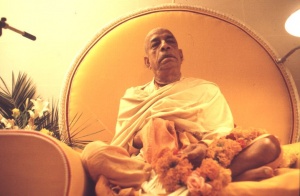SB 3.12.48: Difference between revisions
m (1 revision(s)) |
No edit summary |
||
| Line 1: | Line 1: | ||
{{info | {{info | ||
|speaker=Maitreya | |speaker=Maitreya Ṛṣi | ||
|listener=Vidura | |listener=Vidura | ||
}} | }} | ||
[[Category:Srimad-Bhagavatam - Canto 03 Chapter 12]] | |||
[[Category:Bhagavatam Verses Spoken by Maitreya Rsi - Vanisource|031248]] | |||
<div style="float:left">'''[[Srimad-Bhagavatam]] - [[SB 3|Third Canto]] - [[SB 3.12: Creation of the Kumaras and Others|Chapter 12: Creation of the Kumāras and Others]]'''</div> | |||
<div style="float:right">[[File:Go-previous.png|link=SB 3.12.47]] '''[[SB 3.12.47]] - [[SB 3.12.49]]''' [[File:Go-next.png|link=SB 3.12.49]]</div> | |||
{{RandomImage}} | |||
==== TEXT 48 ==== | ==== TEXT 48 ==== | ||
<div | <div class="verse"> | ||
śabda-brahmātmanas tasya | :śabda-brahmātmanas tasya | ||
vyaktāvyaktātmanaḥ paraḥ | :vyaktāvyaktātmanaḥ paraḥ | ||
brahmāvabhāti vitato | :brahmāvabhāti vitato | ||
nānā-śakty-upabṛṁhitaḥ | :nānā-śakty-upabṛṁhitaḥ | ||
</div> | </div> | ||
| Line 16: | Line 22: | ||
==== SYNONYMS ==== | ==== SYNONYMS ==== | ||
<div | <div class="synonyms"> | ||
śabda- | ''śabda-brahma''—transcendental sound; ''ātmanaḥ''—of the Supreme Lord; ''tasya''—His; ''vyakta''—manifested; ''avyakta-ātmanaḥ''—of the unmanifested; ''paraḥ''—transcendental; ''brahmā''—the Absolute; ''avabhāti''—completely manifested; ''vitataḥ''—distributing; ''nānā''—multifarious; ''śakti''—energies; ''upabṛṁhitaḥ''—invested with. | ||
</div> | </div> | ||
| Line 23: | Line 29: | ||
==== TRANSLATION ==== | ==== TRANSLATION ==== | ||
<div | <div class="translation"> | ||
Brahmā is the personal representation of the Supreme Personality of Godhead as the source of transcendental sound and is therefore above the conception of manifested and unmanifested. Brahmā is the complete form of the Absolute Truth and is invested with multifarious energies. | Brahmā is the personal representation of the Supreme Personality of Godhead as the source of transcendental sound and is therefore above the conception of manifested and unmanifested. Brahmā is the complete form of the Absolute Truth and is invested with multifarious energies. | ||
</div> | </div> | ||
| Line 30: | Line 36: | ||
==== PURPORT ==== | ==== PURPORT ==== | ||
<div | <div class="purport"> | ||
The post of Brahmā is the highest responsible post within the universe, and it is offered to the most perfect personality of the universe. Sometimes the Supreme Personality of Godhead has to become Brahmā when there is no suitable living being to occupy the post. In the material world, Brahmā is the complete representation of the Supreme Personality of Godhead, and transcendental sound, praṇava, comes from him. He is therefore invested with multifarious energies, from which all the demigods like Indra, Candra and Varuṇa are manifested. His transcendental value is not to be minimized, even though he exhibited a tendency to enjoy his own daughter. There is a purpose for the exhibition of such a tendency by Brahmā, and he is not to be condemned like an ordinary living entity. | The post of Brahmā is the highest responsible post within the universe, and it is offered to the most perfect personality of the universe. Sometimes the Supreme Personality of Godhead has to become Brahmā when there is no suitable living being to occupy the post. In the material world, Brahmā is the complete representation of the Supreme Personality of Godhead, and transcendental sound, ''praṇava'', comes from him. He is therefore invested with multifarious energies, from which all the demigods like Indra, Candra and Varuṇa are manifested. His transcendental value is not to be minimized, even though he exhibited a tendency to enjoy his own daughter. There is a purpose for the exhibition of such a tendency by Brahmā, and he is not to be condemned like an ordinary living entity. | ||
</div> | </div> | ||
__NOTOC__ | |||
<div style="float:right; clear:both;">[[File:Go-previous.png|link=SB 3.12.47]] '''[[SB 3.12.47]] - [[SB 3.12.49]]''' [[File:Go-next.png|link=SB 3.12.49]]</div> | |||
__NOTOC__ | |||
__NOEDITSECTION__ | |||
Revision as of 10:37, 5 May 2021

A.C. Bhaktivedanta Swami Prabhupada
TEXT 48
- śabda-brahmātmanas tasya
- vyaktāvyaktātmanaḥ paraḥ
- brahmāvabhāti vitato
- nānā-śakty-upabṛṁhitaḥ
SYNONYMS
śabda-brahma—transcendental sound; ātmanaḥ—of the Supreme Lord; tasya—His; vyakta—manifested; avyakta-ātmanaḥ—of the unmanifested; paraḥ—transcendental; brahmā—the Absolute; avabhāti—completely manifested; vitataḥ—distributing; nānā—multifarious; śakti—energies; upabṛṁhitaḥ—invested with.
TRANSLATION
Brahmā is the personal representation of the Supreme Personality of Godhead as the source of transcendental sound and is therefore above the conception of manifested and unmanifested. Brahmā is the complete form of the Absolute Truth and is invested with multifarious energies.
PURPORT
The post of Brahmā is the highest responsible post within the universe, and it is offered to the most perfect personality of the universe. Sometimes the Supreme Personality of Godhead has to become Brahmā when there is no suitable living being to occupy the post. In the material world, Brahmā is the complete representation of the Supreme Personality of Godhead, and transcendental sound, praṇava, comes from him. He is therefore invested with multifarious energies, from which all the demigods like Indra, Candra and Varuṇa are manifested. His transcendental value is not to be minimized, even though he exhibited a tendency to enjoy his own daughter. There is a purpose for the exhibition of such a tendency by Brahmā, and he is not to be condemned like an ordinary living entity.